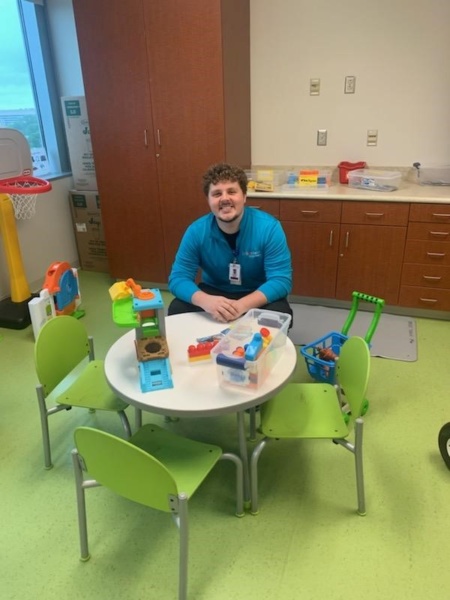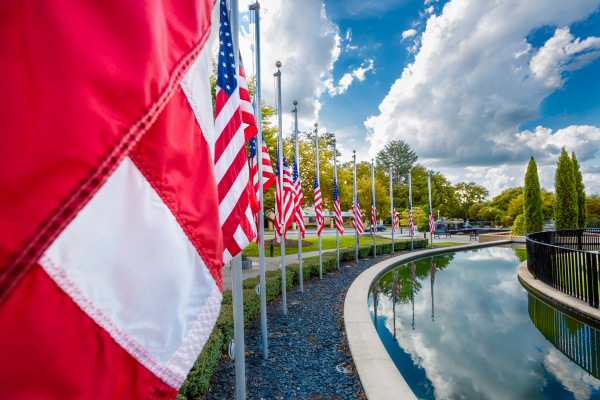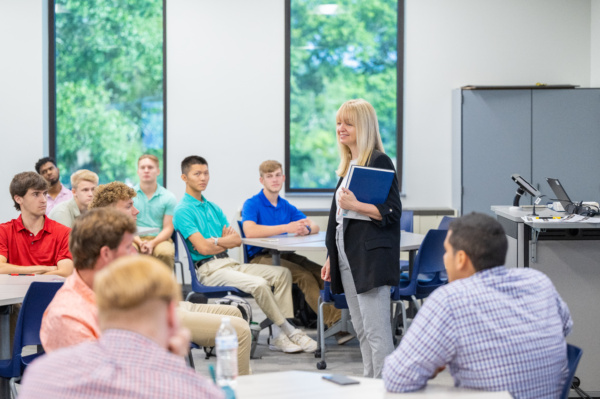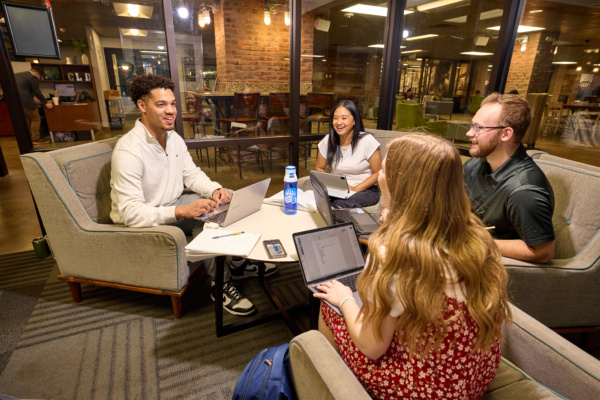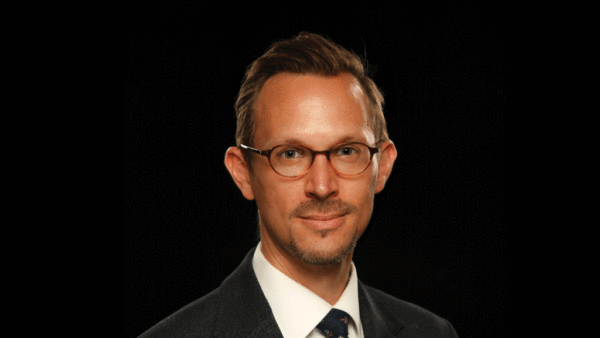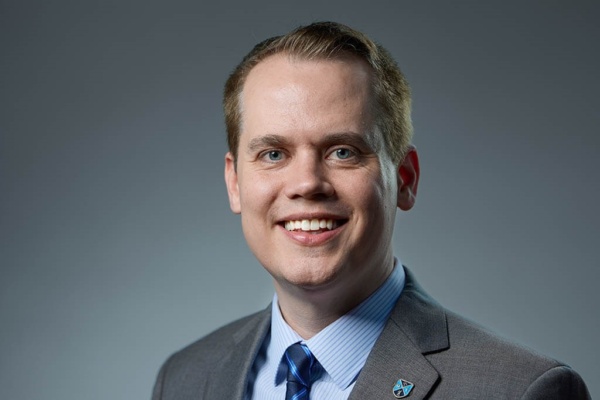Recently, Dr. Julie Hartman was able to catch up with 2022 Child Development graduate Chambers Harwood who is currently completing a 4-month-long Child Life internship at LeBonheur Children’s Hospital in Memphis, Tennessee. Chambers also worked for a year with a Greenville agency serving children with autism.
As we get started, will you briefly explain what Child Life is and what a Child Life Specialist does?
Child life specialists (CLS) are child development experts who focus on the emotional and developmental needs of children and families in a healthcare setting. It’s been around for a long time, but it wasn’t until the mid-1980s that it started to form as an organized profession. There is now a professional organization and journals and certifications that provide guidance to the field.
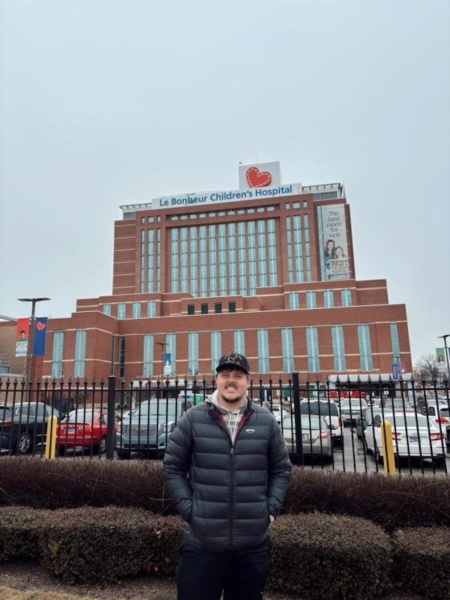
Chambers at LeBonheur Children’s Hospital
Essentially, child life specialists help children acclimate to the hospital and prepare for medical procedures. They also help families better understand the context of the hospital and the medical jargon and procedures their loved one is undergoing. They support the healthcare workers as they provide medical procedures by keeping kids calm and distracted so the procedures can be done quickly and efficiently.
CLS can also act as a bridge for the family during times of bereavement. We help the family and the healthcare workers who are affected by a child’s death. We will help create memories such as doing hand molds and footprint casts or gathering locks of hair for the families to keep as a remembrance of the child. Nurses sometimes seek these kinds of remembrances as well because they have worked with and grown attached to their patients. CLS is there for both sides of the loss.
Sounds like an important role. Can you tell us about the journey you’ve taken to get to where you are now?
Sure, well I actually studied Child Life before I even came to college and had a plan. However, BJU, like many schools, does not have a specific CLS program. While the CLS organization doesn’t require that a person have a degree in CLS, they do accept people who have a variety of degrees, including Child Development, Education, Nursing, and Psychology. A degree in Child Development is really helpful because so much of the CLS job uses therapeutic, medical and developmental play to help patients acclimate to the hospital. Understanding children’s abilities and their use of play at different stages is a key part of the knowledge base. CLS also have to study and know play and other theories—so understanding how children think, how they use language, how they are put together socially and emotionally—these are really important to doing the job well.
However, in order to be a CLS you have to take several specific classes, including classes on play theory, three classes in development and one on death/bereavement. All of these classes are offered at BJU as part of the Child Development program, so I only had to take one online course over the summer from an actual CLS. The hard part is that CLS requires a 600-hour internship or practicum. Most people usually go into a Master’s program in order to secure that internship. It’s hard to land without a lot of experiences in the hospital and the right coursework. I applied as an “independent student” –meaning I wasn’t associated with any university program. Typically, independent students and those who are coming in through undergraduate programs do not get into internships right away. Sometimes you have to wait two or three years in order to finally land an internship. I was so blessed that I was able to land my first choice on my first application. I had to do several rounds of interviews, but I was accepted.
The 600 hours is unpaid and requires a lot of extra work. Not only do I have to complete nine required courses and this internship, but in order to become certified, I have to take a qualifying test. I can take the test only after I land a job and work about three months in a hospital.
There are not a lot of jobs in smaller cities. In Greenville, Prisma Health has less than twenty CLS who serve the hospitals and off-site offices all over Greenville. Shriners Children’s Greenville has only a few. However, larger cities that have several children’s hospitals, like Atlanta and Boston, have a growing need for CLS. Here in Memphis, there are the LeBonheur and St. Jude Children’s Hospitals—they employ 25-30 at the hospital, but they only take one or two interns a year. That’s what makes landing an internship really a big deal. I finished in May and have been applying for jobs for a while. My desire is to eventually come back to Greenville where my family is.
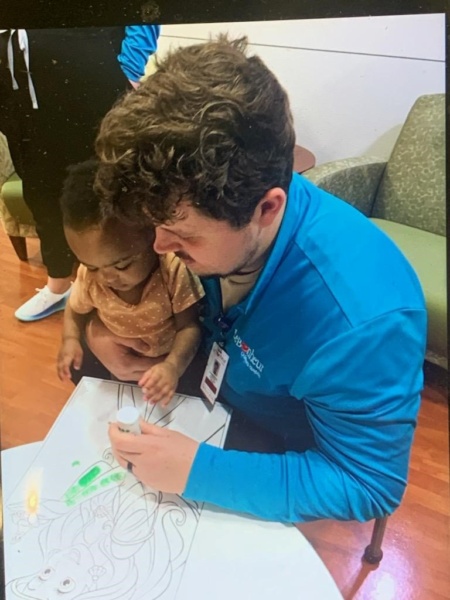
It’s so great seeing the journey God has brought you through to get to this point. So, what advice do you have for someone else wanting to pursue CLS as a career?
First, make sure you know what CLS is all about. Get into the hospital as a volunteer as soon as you can. Do what you can to learn the world of the hospital—it is its own world with its own way of doing things and its own language. Interview a CLS and find out exactly what is required. You will probably have to make your own way. If you are going to BJU, study Child Development or Nursing, and be sure you understand child development, development theory and play theories. You have to know the theories really well because that’s in everything you do. Also, you have to do a lot more outside of class than inside. I worked over the summers and Christmas breaks at the hospital. I did both my first internship and my capstone at Prisma as a volunteer and I worked at summer camps for medically fragile kids. Nothing was paid, but I learned a lot and used all of it. The CLS staff will do everything they can to help you. They want you to succeed just like your BJU faculty do.
You also can’t be afraid to take risks or make mistakes because that’s how you learn. You have to be bold as well as willing to take directions. You really can’t sit in a bubble and serve people in a hospital. You have to meet people where they are and get out of your comfort zone to be a loving servant of the Lord. Whatever that means or looks like when you are with people—that’s what you do. Give of yourself and get outside of yourself. Be willing to serve. Be willing to make mistakes. Ask to try again if you do make a mistake. I remember when I started, I had to give presentations to the CLS team. I was terrible at it. I didn’t prepare well. They told me how much I needed to do better, so I did. I asked to do it again—and again. Now, I present every week, and I make sure I’m prepared. I have to work hard if I’m going to move to the next level, and I’m not afraid to work hard or make mistakes. That’s the price you pay to grow and get better. If this is God’s calling for you, prepare for it. Study. Learn more. Be open to working with children who have disabilities. Find as many opportunities to serve and learn as you can.
